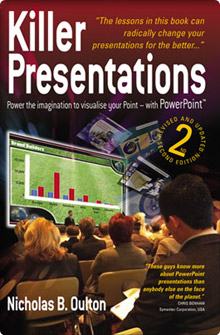The 7 best practices of the 9-figure sale…
I’ve been involved in 100s of 6 figure deals but only 5 9 figure ones. One infrastructure bid ($2.6B), 4 IT outsourcing bids (all around $1.2B), well the clients won them all, we, as some of them like to point out only do the presentation and the pitch is so much more than just the final face to face. I have done one other bid worth this kind of money, and the client actually lost it TV sports rights for International Cricket.. but the team who won it, won it on price and subsequently went bust over it, thus proving that sometimes losing is the best result!
So I’m not sure how qualified I am to offer sage advice about winning 9 figure deals but my experience of them is that they are pretty much the same as 6 figure ones… and on those I’m pretty experienced, 76% hit rate on over 150 deals over the last 15 years.
So here are my 7:
- Don’t bid
- Don’t present
- Don’t DIY
- Don’t trust
- Don’t play fair
- Don’t preach
- And whatever you do: Don’t use bullets
Perhaps I should explain:
Don’t bid
The last $Billion I worked on cost the bidder £4million, which even at a low percentage profit of say 5% is an amazing ROI but for each winner there are at least 2 losers, in the last one 6! And they didn’t get a good return; they got nothing (although I think some of them may have got fired!).
When I’m asked to join a bid team I try very hard to persuade them to No Bid. I rarely succeed, but the last few times I have, they eventually won the deal. Purchasing need to run a process and in order to run a process they need you to bid so especially if you are the market leader saying no generally gets an indignant “Why Not?” which gets us in at the ‘C’ suite to talk about why the bid is flawed and how as it is it will fail and how if they change the plan it will succeed and of course then, we would be happy to bid.
In my experience No Bidding fleshes out the real deals from the smoke screens, gains you access to the right people and allows you focus on the deals that are real and winnable rather than just desirable.
Don’t present
All too often presenting is a one way flow of information. The more dialogue you can get the easier it is to win. If the prospect wants to talk, let them. In fact we plan it, nurture it, manipulate it. People are much more likely to buy a plan they helped develop the more they feel ownership of it the more they buy into delivering it. We have had great success at getting prospects to join in, drawing the solution with the presenter. When at the next meeting the diagram is presented back to them.. the team hit a home run.
Don’t DIY
All that effort, all that time, all that money and you show up with home made slides.. Nothing says lack of commitment like DIY. Get professional help for the presentation, for the RFP, use designers, use coaches, use experts. As I like to point out when a client tells me that my fee is expensive.. it’s a dam sight cheaper than losing!
Don’t trust
Straight out of Sun Tsu, battles are won and lost on the quality of the intelligence you have. You never know the truth, you can never ask too many people for intel. Develop coaches, hire consultants, lobbyists, ex-prospect employees, current employees family; anything that can give you better intelligence. The ones that lose are the ones who think they know the truth.
Don’t play fair
Don’t throw away your integrity but winning is ALL that matters. I used to say “there are no prizes for second” but I now prefer Tiger Woods quote, “Second means you’re the best of the Losers!”
Don’t Preach
So winning a $Billion deal is a big thing, but so is spending a $Billion. The key decision maker probably has an ego the same size as yours. They want to be listened to, they want to talk and they want you to respond. Be wary of being sycophantic and remember you don’t get to the position anywhere where you have to make a $Billion decisions without being Very Smart, Very Ruthless or VERY VERY lucky.
Don’t use Bullets
Clearly doesn’t need an explanation, bullet-points are best left to the competition.
